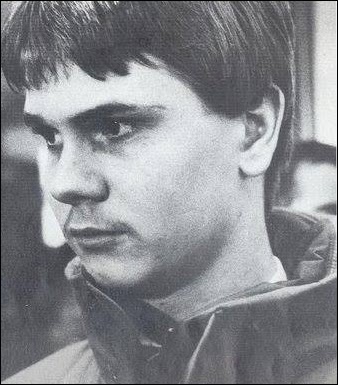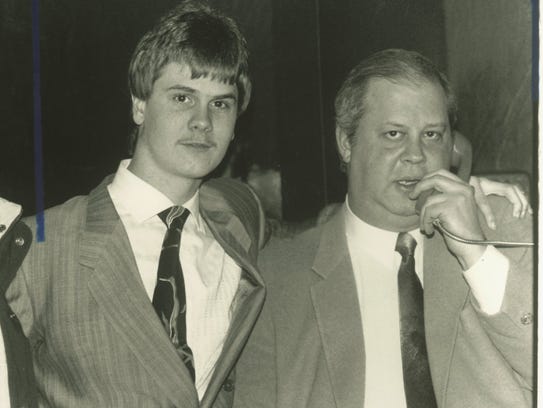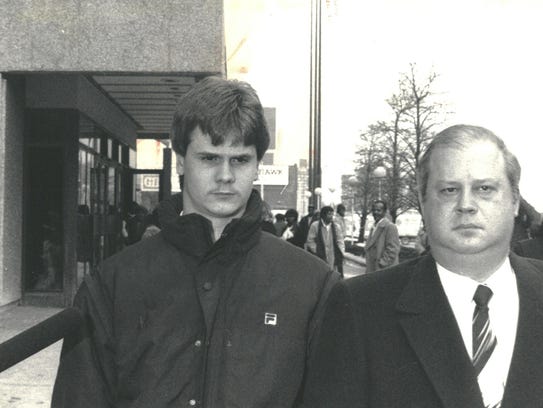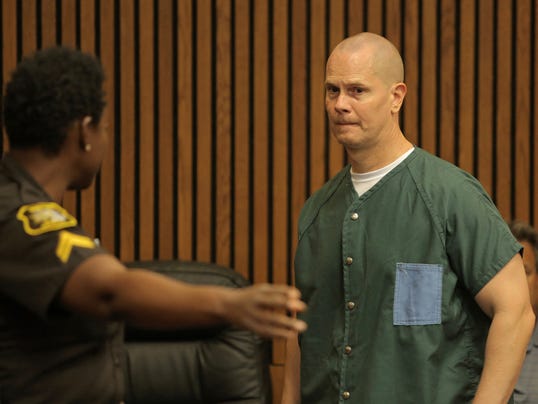by Ran Britt
Wershe's lower middle-class family lived in a predominately African-American eastside neighborhood, about seven miles from downtown Detroit, that was also home to John and Leonard "Leo" Curry. The Wershe family lived in a brick house on Hampshire Street, across the street from Richard, Sr.'s parents' home. When Rick was six-years-old, Darlene left the family. Richard, Sr. made a living buying and selling firearms, including semi-automatic handguns and sub-machine guns. He would eventually manage Newman's, a gun store located in downtown Detroit. When Rick was eight-years-old, his father taught him how to fire a gun and started taking him to gun shows at Detroit's Light Guard Armory. He later gave him his own .22-caliber rifle. When Rick was 13, the neighborhood became one of several casualities of white-flight, owing to the decline of the city's auto industry and its accompanying layoffs.
Around that time, Rick's parents gave in to his requests to move in with his mother in the suburb of Clinton Township. Though he clashed with his new stepfather, he enjoyed the new environment. However, he became involved in petty crime, breaking into homes with Terrence Bell, who was dating his older sister, Dawn, who had become a crack user. According to Rick, he himself had only snorted cocaine once.
At 14-years-old, Rick started hanging out with Rudell "Boo" Curry, Johnny and Leo's younger brother. They frequently rode around in Rudell's Ford Bronco, picking up girls. They also frequently spent time at a local roller-skating rink, Royal Skateland, at which Rudell's older brothers regularly held court and essentially threw impromptu parties.
Rick's first arrest took place on March 24, 1984. After pulling into a gas station near the Wershse's home, the car Rick was driving, his grandmother's, was stolen while he was inside buying a soda. After being alerted by Dawn, who'd driven another car to the station and was blowing the horn, Rick got into Dawn's vehicle and the two pursued the thief on I-94. Rick fired two shots from the .22-caliber revolver Dawn kept in her purse and, unfortunately for him, an off-duty police officer was in the car next to them and subsequently pulled Dawn over. But as luck would have it, the officer failed to appear at trial, leading to the charges being dropped.
At 14-years-old, Wershe began his career as a confidential informant. He was recruited by the FBI because of his familiarity with members of the predominately African-American Curry brothers drug trafficking organization, who were under investigation by the bureau. To conceal the fact that they were using a juvenile to gather intel, the agents unofficially hired him in June of 1984 and used the same codename, "Gem", that they'd given to his father, who had already been an informant for some time. Initially, his role was limited to identifying the names of individuals in photos shown to him by the FBI. Rick would often attend clandestine meetings with FBI Agent James Dixon in the parking lot of a church near Livernois Avenue for debriefings.
In February of 1985, investigators used Rick's intel to secure a warrant to search a home in which they seized $200,000 in cash. His duties quickly escalated to making drug buys for the Detroit police, including Officer Billy Jasper. Wershe's handlers even provided him with buy-money and an ID that stated that he was 21-years-old. Rick's payment for helping the authorities would sometimes run as much as $2,000 per job -- in cash. According to Wershe, his assistance netted him a total of $30,000.
Johnny Curry sometimes took Rick along to watch the Detroit Tigers play. He even accompanied the Currys to the world middleweight championship boxing bout between undisputed champion "Marvelous" Marvin Hagler and Detroit-native Thomas "The Hitman" Hearns held on April 15, 1985 in Las Vegas, Nevada. The FBI gave him $1,500 to pay for expenses during the trip.
During a drive-by shooting targeting the home of Leon Lucas, is 13-year-old nephew, Damion Lucas, was inadvertently killed by three Curry triggermen after being shot in the chest. Lucas, a Curry-associate, had been given the responsibility of arranging the itinerary but was unable to purchase tickets to the fight ahead of time. The shooting was intended to be a message to Lucas, who wasn't home at the time. Following Damion's killing, Johnny reportedly held an organization meeting in the basement of his home, during which he offered to pay anyone in-the-know to keep quiet about the matter if questioned by police.
Wershe reported that he'd personally attended the meeting. He also informed the FBI of Detroit Police Homicide Inspector Gilbert Roland "Gill" Hill's successful efforts to direct the investigation of Damion's murder away from the Curry brothers. Wershe was a passenger in Johnny Curry's Bronco when he heard Hill and Curry discussing the matter during a speakerphone conversation on the car phone. Hill, who appeared as Inspector Todd in the Beverly Hills Cop film trilogy, and was later elected president of Detroit's City Council, died in February of 2016.

Rick eventually started selling cocaine himself, buying eight balls and crack from the Currys to be resold. He began amassing a circle of 15 or so drug dealing friends as well.
When he was 15, another Curry-associate accidentally shot Rick in the stomach, in his home, with a .357-caliber handgun. The wound required hospitalization and the use of a colostomy bag for a time even after his release.
In June of 1986, law enforcement dropped Wershe, who'd dropped out of school in the 9th grade following his shooting, as a CI and he resumed selling cocaine without their oversight. He was supplied by local Arthur "Art" Derrick, whom he met through the Curry brothers. Derrick owned a fleet of four planes, two of which he purchased from the Rolling Stones, which he used to fly product in from Miami, netting $100,000 profit per day at his peak. Rick would sometimes accompany Derrick to Miami where he'd reserve half of a floor at the Hilton and procure the services of escorts. Wershe was given the nickname, "White Boy Rick", by Derrick so that he could easily distinguish between Wershe and fellow-Detroit cocaine dealer Richard "Maserati Rick" Carter. Derrick, who died in 2005, lived in a palatial home with a marble-floored basement and a pool bearing his initials on the bottom.
Rick made connections of his own in Miami and began receiving 50-kilogram shipments from his new supplier. Wershe hardly went unnoticed, often wearing mink coats, gold chains, Adidas tracksuits, a diamond-encrusted Rolex and gold belt. He also had a preference for Guess and Calvin Klein brand jeans and Gucci luggage. Despite his lack of a driver's license, Wershe drove a white Jeep that read, "THE SNOWMAN", on the back. The Jeep, however, was only one of Rick's eight vehicles. He also purchased a Chevrolet Camaro Z28 and a Ford Bronco like the one each of the Curry brothers drove -- Rick's was painted green and tan. He and Rudell also had matching 750cc Honda Interceptor motorcycles.
Around that time, Rick followed in his father's footsteps and became a small-time arms dealer as well. He'd buy guns in Toledo from Ohio state troopers he met at a gun show and resell them back in Detroit. That September, Rick made a $1,600 cocaine sale to an undercover DEA agent at his childhood home.
Rick moved out of his father's home again when the elder Wershe discovered and confiscated a shoebox containing $50,000 in cash under his bed.
In 1987, he began a romantic relationship with Johnny Curry's (who was in federal prison awaiting trial) wife, Cathy, who was seven years his senior. She even gave Rick a five-karat diamond ring for his birthday. Cathy's father, Willie Volsan, had himself been a gambling racketeer-turned-heroin distributor in the 1970s. Cathy used her familial relationship to her uncle, Detroit mayor Coleman A. Young, to gain access to information regarding police investigations involving herself and those in her circle -- including Wershe. In fact, Wershe was on hand when federal agents conducted a raid on her townhouse in June of 1987 and discovered reports prepared by Detroit narcotics officers and a list of unlisted telephone numbers belonging to several high-ranking members of Detroit police personnel.
That same year, Rick was targeted in an unsuccessful drive-by while riding in the passenger seat of a friend's convertible. While the two were stopped at a red light, a van pulled up beside them. The sliding door opened and the two were only saved from the gunfire that followed because they ran the light. Nathaniel "Boone" Craft, an enforcer for the Best Friends drug trafficking organization with 30 murders to his credit, later admitted to being the triggerman.
On May 22, 1987, at about 9 pm, Wershe was arrested when police found him in possession of eight kilograms of cocaine and thousands of dollars in cash. He was stopped by police, including Officer Rodney Grandison, whom he recognized, in a friend's Thunderbird in front of his childhood home. When the officers spotted a Kroger grocery bag full of cash on the floor of the car, Wershe, who had been riding in the passenger seat, initiated a scuffle with one of the cops. After both Richard, Sr. and Dawn came outside and joined the small crowd of onlookers, Rick's father grabbed the bag and gave it to Dawn, who ran to her grandparents' home across the street. The officers, who'd pursued Dawn, discovered the bag of cash in a linen closet. Though the police reported the amount as $30,000, Wershe later testified that the arresting officers seized $34,000. That same night, police also located a cardboard box containing eight kilograms of cocaine that, according to an anonymous tip, Rick had hidden under a neighbor's porch.
Rick was charged with possession of intent to deliver less than 50 grams of cocaine and possession with intent to deliver more than 650 grams of cocaine. He was granted bail in the amount of $250,000 for the first charge and $750,000 for the second.
On September 12, an associate of Rick's, Steve "Freaky Steve" Roussell, was murdered when notorious Best Friends gang enforcer Reginald "Rockin' Reggie" Brown shot him to death as he slept. Brown, who'd reportedly had a dispute with Roussell over a mutual female acquaintance, entered Roussell's residence in the 13600 block of Glenwood in the early morning hours and shot the latter as well as his cousin, Patrick "Little Pat" McCloud, who survived, who'd been sleeping in the living room and was awakened by gunfire. Though Brown was convicted of second-degree murder and sentenced to life in prison, he was released after the conviction was overturned on appeal fifteen months after the shooting.
In October, Rick was arrested again near the Royal Skateland rink and charged with possession of five kilograms of cocaine. He was arraigned on October 14, 1987 and again granted bail.
On October 27, federal agents and members of the Detroit Police Department executed a search warrant on Richard Sr.'s 77-year-old mother Vera's home at 13059 Hampshire Street, where they seized weapons, ammunition, $2,000 in cash from a safe belonging to Wershe and parts for 23 gun silencers. Law enforcement then proceeded to execute a search warrant on Wershe's home, which was located across the street from his mother's, at 13028 Hampshire. It was there that five gun barrels that fit the silencer parts were found on a bed and seized. Wershe's fingerprints were later matched to those found on seven of the silencers.

Cathy Volsan Curry and Willie Curry
Prior to his trial, Agent Groman met with the Wershes at a hotel and offered assistance on behalf of the government in exchange for Rick's testimony against prominent drug traffickers. Fearing for his life, Rick declined the offer.
Rick's trial at the Frank Murphy Hall of Justice in downtown Detroit began in January of 1988. He eschewed his usual Fila sneakers for alligator loafers. Though he initially hired attorney William E. Bufalino II as his legal counsel, Cathy advised Wershe to replace him with Ed Bell and Sam Gardner -- both African-American attorneys with ties to Mayor Young. The pair's first act as Wershe's legal team was to withdraw Bufalino's pretrial motion challenging the admission of the drugs found on Wershe, which did not contain his fingerprints, into evidence.
Witnesses testified that Wershe had been pistol-whipped by the officers during his scuffle with the police. Richard, Sr. allegedly told a cop in the hallway, "You better not sleep too well," and was arrested and charged with threatening an officer. The jury deliberated for four days and deadlocked twice before agreeing to a guilty verdict.
On January 15, 1988, Rick was convicted of one count of possession with intent to deliver more than 650 grams of a substance containing cocaine. (It would be his third criminal conviction.) By the time he was convicted, Wershe was the father of two young girls.
Richard, Sr. granted interviews to journalists, in which he revealed his family's informant history, while incarcerated in the Wayne County Jail. Bufalino, however, disputed the claim that his former client had cooperated with the government. The FBI refused to corroborate Wershe's assertions, citing agency confidentiality policy.
On February 4, Rick was sentenced to life without the possibility of parole, which was the mandatory sentence for the conviction under Michigan law at the time. Only one other state at the time, Alabama, mandated life sentences without parole for first-time drug convictions. However, Alabama law stipulated that the accused possess at least 10 kilograms of cocaine to be eligible for the mandatory sentence.
Richard, Sr. granted interviews to journalists, in which he revealed his family's informant history, while incarcerated in the Wayne County Jail. Bufalino, however, disputed the claim that his former client had cooperated with the government. The FBI refused to corroborate Wershe's assertions, citing agency confidentiality policy.
On February 4, Rick was sentenced to life without the possibility of parole, which was the mandatory sentence for the conviction under Michigan law at the time. Only one other state at the time, Alabama, mandated life sentences without parole for first-time drug convictions. However, Alabama law stipulated that the accused possess at least 10 kilograms of cocaine to be eligible for the mandatory sentence.
On April 22, 1988, Richard, Sr. was convicted of possession of 23 silencers. He was given a seven and a half year sentence and charged a $50 fine.
In an attempt to gain leniency, Wershe cooperated with a 1990 FBI investigation of Detroit police officers participating in the shipment of drugs to Detroit City Airport (now Coleman A. Young Municipal Airport). He had been approached by his former FBI handler Agent Groman in July while incarcerated at Marquette Branch Prison, largely due to the bureau's suspicions that leaks within the Detroit Police Department, which had compromised FBI investigations, were attributable to Cathy Curry and Sergeant James Harris. Wershe's involvement in the eight-month sting, nicknamed Operation Backbone, included introducing Miami drug supplier Mike Diaz to Cathy Volsan Curry (who often visited him) via Dawn, who had dinner with the two of them on July 26. Cathy in turn introduced Diaz to her father, Willie Clyde Volsan, Jr., who happened to be married to Mayor Young's sister. Unbeknownst to the Volsans, Diaz was actually undercover FBI Agent Mike Castro and he'd recorded his conversations with them. Castro's fellow agents even stole Volsan's Cadillac from a mall parking lot in order to plant listening devices inside before returning it. Volsan connected Castro with police officers, who agreed to provide security for "Diaz's" cash and 100 kilogram cocaine shipments, which they did on at least five occasions. One of the officers even smuggled a machine gun into the Detroit Metropolitan Airport, while in uniform. Willie Volsan, Cathy Curry and four others were arrested on May 21, 1991, on charges of accepting money for protecting narcotics trafficking. The following day, 11 police officers, including Harris, Angela Canoy-Simmons and Julandra Young, were arraigned on federal charges of illegally providing protection for narcotics trafficking and released on bail. Harris had accepted $50,000, while most of the other cops took $3,000 per flight. In June, however, the charges against Cathy and the 11 police officers were dropped to allow the government more time to investigate. Eventually, Harris was sentenced to 30 years in prison; Willie Volsan was sentenced to 19 years and five months; Canoy-Simmons received a three-year term; and Young was given two years and six months. Wershe's assistance resulted in his admittance into the federal witness protection program by the Justice Department and he was transferred to a medium-security prison in Marianna, Florida. Cathy's charges were subsequently dropped. Harris received a presidential pardon from George W. Bush in 2008.

Richard Wershe Jr., left, stands with his attorney, William
Bufalino II, in Recorder's Court in Detroit on January 14,
1988. (Photo: William Dekay, Detroit Free Press)
In August of 1991, Richard, Sr. was paroled after serving three years in prison for his weapons conviction. On March 11, 1992, he was arrested outside of his home by U.S. marshals for violating parole by not filing monthly activity reports, a condition of his parole. A month earlier, Dawn Wershe, who lived with him along with her three children, had accused her father of assaulting her. She told police that he'd struck her following her return home after a three-day absence in which he was left to care for her four-year-old, two-year-old and two-month-old with no knowledge of her whereabouts.
In 1998, the mandatory life without parole sentence for simple possession was ruled unconstitutional for violating the Michigan Supreme Court. Consequently, Wershe was granted his first parole hearing on March 27, 2003.
In 2006, Wershe was convicted for racketeering and conspiracy to commit racketeering involving a car-theft ring while in prison in Florida. After a good deal in Auto Trader Magazine caught his eye, Wershe gave the Miami car-dealer's contact information to his sister, Dawn, who was raising his daughter, and urged her to call. The idea was that she'd re-sell the car in Detroit for a profit -- since, ironically, auto prices are higher in the Motor City. Wershe also passed the dealer's information on to fellow inmate, who's son in Virginia needed a car. Dawn earned a profit of at least $6,000 from the sale of four cars. However, the vehicles turned out to be stolen, with altered VIN numbers used to defraud Florida officials into issuing new titles. Wershe's role was discovered during a two-year criminal investigation nicknamed Operation Road Runner. Wershe's plea agreement included the provision that charges not be filed against Dawn nor his mother. After pleading guilty to racketeering and conspiracy to commit racketeering, Wershe received a five-year prison sentence, though he received credit for 488 days. Wershe was expelled from the witness protection program as a result of his conviction. Convicted Queens, New York drug kingpin Lorenzo "Fat Cat" Nichols pleaded guilty to racketeering for his role in the car-theft scheme in December of 2006. Nichols, who was also incarcerated in Florida and in the witness protection program, received a 10-year sentence after confessing to heading the auto-theft ring, which sold over 250 Florida vehicles to 14 other states from 1999 - 2005, grossing $8 million in the process.
Wershe's father, Richard, Sr., died in 2014.
On August 6, 2015, Wershe filed a second motion for relief from judgement (the first motion, filed in 2001, was denied in 2003) and on September 4, the motion was granted by Judge Dana M. Hathaway. Two weeks later she ordered that his sentence be vacated and that he be re-sentenced due to his status as a minor at the time of his conviction.
On August 22, Wershe was released from the Oaks Correctional Facility in Manistee, Michigan into the custody of the U.S. Marshals Service for transport to a Florida Department of Corrections facility in order to serve three years and eight months (of a five-year sentence) for his 2006 felony convictions tied to the car-theft conspiracy. After first being transferred to FCI Milan (Federal Correctional Institure, Milan) in Michigan, he was taken to the Federal Transfer Center in Oklahoma City, Oklahoma before being transported to the RMC (Reception and Medical Center) in Lake Butler, Florida. His official release date is April 20, 2021.
He now has three children and six grandchildren.






Related:
The Infamous...Maserati Rick
The Infamous...Demetrius Holloway

The Infamous...Edward "Big Ed" Hanserd